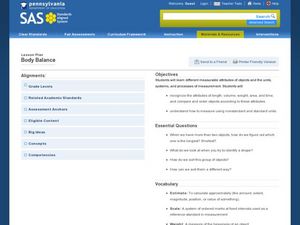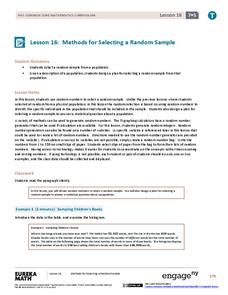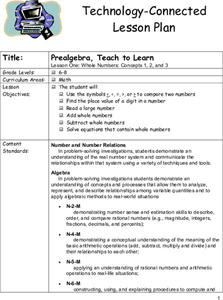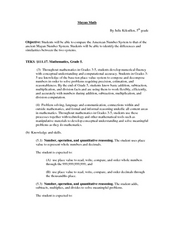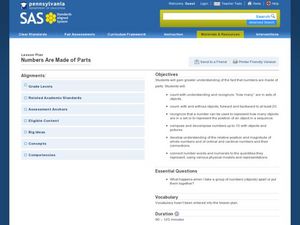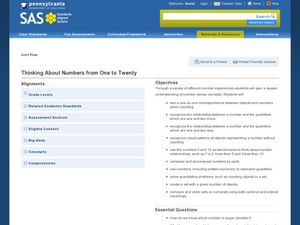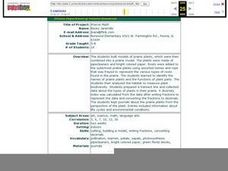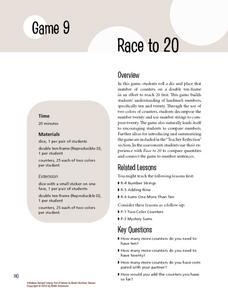Curated OER
Comparing All Three worksheet 4
In this problem solving worksheet, students write decimals as fractions or mixed numbers and simplify fractions when needed. Using a chart, students fill in the blanks for twenty problems.
Ohio Department of Education
Fraction Models - Grade Three
Explore fractions using different manipulatives and illustrations. Your class can create a variety of models of fractions and mixed numbers with drawings and manipulatives. They then work to compare fractions, mixed numbers, and whole...
Curated OER
Body Balance
Examine measurable characteristics of objects to build an understanding of the different ways you can discuss an object's size when comparing it to other objects. After whole group instruction, the class compares and organizes several...
Curated OER
A Slice of Pi
Math pupils, by viewing a video, discover the history of pi and some of the applications of its uses in the world today. They conduct an experiment by measuring the diameter and circumference of various circular objects to calculate...
Curated OER
Comparing and Ordering Greater Numbers
Students compare and order greater numbers. In this place value lesson, students use a place-value chart to identify which set of numbers has the greatest value.
Curated OER
The Number Line
Represent, order, and compare rational numbers in order to practice placing them on a number line. Your class will use appropriate operations, methods, and tools to compute with real numbers. Then they must explain completely and clearly...
Curated OER
Problem Solvers
Fifth and sixth graders compare decimals to the place-value structure in the base-ten number system. They represent fractions as parts of unit wholes, as parts of a set, as locations on a number line, and as divisions of whole numbers....
Armory Center for the Arts
Place Value Collage
How can art represent math? Use a lesson on place value collages to illustrate the different meanings that numbers have in their designated places. Kids observe photographs and paintings that show place value, then work on their own.
EngageNY
Methods for Selecting a Random Sample
Random sampling is as easy as choosing numbers. Teams use random numbers to create a sample of book lengths from a population of 150 books. The groups continue by developing a technique to create samples to compare from two populations...
Curated OER
Fraction City
Welcome to Fraction City! This is an incredibly interactive and fun way to teach properties of fractions, and reaches multiple learning styles. Scholars create "blocks" by folding strips of paper in various increments (thirds, fourths,...
Center for Mathematics and Technology
Whole Numbers: Using an Area Model to Explain Multiplication
There are many ways to work through a multiplication problem. Using an area model, kids complete several worksheets with different types of multiplication problems, including multiplying by ten, and explain how the new strategies differ...
Curated OER
Whole Numbers
Student are assigned one of the sections on whole numbers. After reviewing the content, they teach their assigned sections to other class mates. They publish their findings on a PowerPoint slide show to use when they teach their section.
Curated OER
Number and Operations: Webbing Our Way Through Numbers
Second graders explore estimation and place value. In this place value lesson, 2nd graders estimate and construct numbers while working with spider activities. Students use addition and subtraction to compare estimates. Resources and...
Curated OER
Mental Math Blocks
In this mathematics worksheet, pupils solve various types of problems in each of the squares. They use symbols to compare numbers. They also divide and multiply.
Curated OER
Mayan Math
Fifth graders investigate the Maya's as mathematicians. In this Mayan math lessons, 5th graders work with the ancient Mayan numbering system by comparing it to the American Number System. They tell the differences and similarities...
Curated OER
Order Numbers On a Number Line
Fifth and sixth graders study the use of a number line to add integers and they observe a teacher demonstration of how to add integers on a number line. Afterward, they construct a number line and use the number line to solve addition...
Pennsylvania Department of Education
Numbers Are Made of Parts
Children play with barnyard animal cards to practice composing and decomposing numbers. With their "secret number" of animal cards in a cup, they shake and spill them onto a barn story board, counting how many animals fall in the barn...
Pennsylvania Department of Education
Thinking About Numbers from 1 to 20
Help your kindergarteners discover new number-sense concepts and to compose and decompose numbers. Though the resource contains no procedural details, the assessment tool (which you can find in the "printer friendly version") has lots of...
Curated OER
The Math Of African Music
Students practice rhythms and fractions on African drums in this Music lesson mixing Math skills and music notation. The lesson also includes ideas for assessment and state and national benchmarks met.
Curated OER
Arranging Numbers from 1 to 5
Kindergarteners arrange manipulatives or everyday objects in groups of one through five. They identify groups seen in pictures of nature and compare same numbers of different objects.
Curated OER
Prairie Math
Students work together to build models of prairie plants. Using the model, they estimate the height and then measure them using metric and standard units. They write a fraction to represent their part of the whole set and compare and...
Curated OER
Telling Time as an Everyday Use of Numbers
How can we estimate time? Have your young mathematicians make a clock. Then they compare and contrast types of clocks. They practice writing times in two different ways and make a book about telling time.
EngageNY
Writing Equations Using Symbols
Build upon prior equation writing experience to create more complicated equations. Lesson one in a 33-part unit builds upon the class members' sixth and seventh grade experience of writing linear equations. Several examples provide...
Math Solutions
Race to 20
And they're off! Working in pairs, young mathematicians roll dice to see who can fill in their double ten-frames first. When students finally fill in their arrays, they create addition number sentences that represent their rolls, helping...




